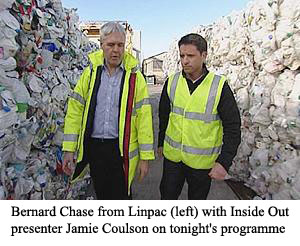BBC claims recycling "scandal" in Yorkshire
 One of the biggest plastics recyclers in the UK has blamed the use of commingled collections for its need to import waste plastics from abroad to use in its production process.
One of the biggest plastics recyclers in the UK has blamed the use of commingled collections for its need to import waste plastics from abroad to use in its production process.Linpac Plastics Recycling, based just north of Castleford, West Yorkshire, is featured on a BBC One Yorkshire & Lincolnshire programme tonight, investigating quality issues within the region’s recycling sector.
On the programme, part of the regional current affairs series “Inside Out”, Linpac questions why thousands of tonnes of waste plastics from this country are being shipped to China for reprocessing, while British recyclers are shipping similar material in from continental Europe.
Ahead of tonight’s broadcast - which will be available on the web to other UK viewers once shown - the BBC described the situation as a “scandal currently facing the region’s growing recycling industry”.
Recycling Action Yorkshire - the regional development organisation - told letsrecycle.com today it would be “very disappointed” if the programme does portray a view that the situation is a “scandal” given the good work going on in Yorkshire.
It said the region is consistent with the national average for exporting waste plastics - which is as high as 50% of the plastic packaging waste collected for recycling. It pointed out that most industry sectors tend to import and export raw materials, stating: “Why should the recycling industry be any different?”
Linpac
Linpac, which is licensed to process up to 30,000 tonnes of plastics each year at its site in Allerton Bywater - ranging from bottles to polystyrene cups, crates, pails, drums and pipes - is now importing 40% of its plastic from Belgium and Holland.
The company reports on the programme that it is forced to import the material despite suitable plastics being left out for recycling by Yorkshire residents, and its managers blame the quality of commingled doorstep collection schemes adopted by many local councils.
Featured on the programme, Linpac purchasing manager Bernard Chase said: “I think the man in the street is going to remain somewhat astounded at the reality of what in fact is going on. Quality has deteriorated because of the expediency of commingled collections and the ease with which this can be exported. I think we need a change of emphasis.”
Waste management company Yorwaste, which sorts commingled material collected in the region at its materials recycling facilities at Scarborough and Hessay, said the situation was that good prices are being offered by the Chinese for the material.
John Miller, recycling and external affairs manager at the Northallerton-based company, said: “At the moment this valuable resource is worth more if we export it to China than leave it in the domestic market. The market’s very strong for this mixed plastic and we haven’t got a secure outlet in the UK.”
The Inside Out programme tonight also hears from Berryman Glass, which collects glass waste on behalf of the container industry. It complains that commingled collections are causing it “major problems”, because of the quality of glass is less reliable than from material collected in bring banks.
RAY
Recycling Action Yorkshire, which is part of the Yorkshire Forward development agency, said ahead of the programme that it hoped the broadcast would cast a fair view of the “considerable progress” in the region’s recycling.
RAY itself has worked with the programme makers to highlight the different views of the region’s recycling, which is averaging a 27% rate for household waste and grew by 5 percentage points last year.
Andy Hartley, RAY’s programme director, suggested there would be no excuse for the broadcast to give a one-sided view of recycling in Yorkshire. “When you look at the evidence, you couldn’t justify the word ‘scandal’,” he said.
Mr Hartley explained that all local authorities in Yorkshire now collect waste plastic for recycling, and 50% of councils in the region collect at the kerbside. Although the region’s capture rates are only half the national average, and Mr Hartley accepted there was more work to do, he said: “We should be very encouraged by the progress being made.”
He added that there could be a danger that tonight’s programme could affect householders’ participation in recycling at a time when “people are just starting to engage”. “Their participation is not something we should just take for granted,” he warned.
“Individual views”
Commenting specifically on the concerns about exporting material, Mr Hartley said he hoped that the programme makers were not focussing on just a handful of businesses, who would naturally have “individual views” on their raw materials streams.
He said: “Virtually every industrial sector imports and exports a minimum of 10% of its raw materials, so we put the view to the programme makers, that why should the recycling industry be any different?”
If anything, he said the fact that the region had local reprocessing capacity available provided an opportunity for more plastic recycling, and he claimed that regional collection infrastructure was now responding to that opportunity.
“There are frustrations between the collection side and the recycling industry because they’ve got different drivers, and that does cause tensions,” the RAY director concluded. “I think that there are so many views on the issue, and a lot of strong feelings from both sides about commingled collections, but what it comes down to is individual relationships between each local authority and their waste management companies.
“It would be difficult to make a blanket decision that commingled collections are good or bad.”
You can return to the main Market News page, or press the Back button on your browser.

